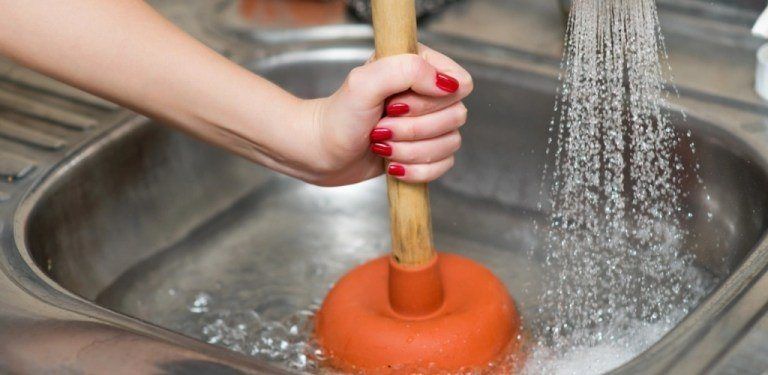ADVERTISEMENT
2. Hot Water and Dish Soap
For grease clogs or minor blockages caused by soap buildup, this method is a quick and effective solution.
What You’ll Need:
- Dish soap (preferably eco-friendly)
- Boiling water
Steps:
- Pour about 1-2 tablespoons of dish soap down the clogged drain.
- Let it sit for 10-15 minutes to loosen any grease or soap buildup.
- Pour boiling water down the drain to wash the soap and debris away.
This method works wonders for greasy kitchen sinks and is gentle on your pipes.
3. Plunger
A plunger is a trusty tool that doesn’t require any chemicals and works on most types of clogs.
What You’ll Need:
- A plunger (preferably a cup plunger for sinks)
Steps:
- Ensure there’s enough water in the sink to cover the plunger.
- Position the plunger over the drain and plunge vigorously.
- Repeat the process a few times to create suction, which will help break up the clog.
- Rinse with hot water to clear out any remaining debris.
A plunger is a simple, yet effective, tool that can clear most blockages without causing harm.
4. Drain Snake or Auger
For more stubborn clogs, a drain snake (also known as an auger) is an eco-friendly tool that can reach deeper blockages without damaging your pipes.
What You’ll Need:
- Drain snake or auger (can be found at most hardware stores)
Steps:
- Insert the end of the drain snake into the drain.
- Slowly twist and push the snake down the pipe to break through the clog.
- Once the blockage is cleared, pull the snake out and rinse the drain with hot water.
This method is safe, non-toxic, and works well for more severe clogs caused by hair, grease, or other debris.
5. Enzyme Cleaners
Enzyme-based drain cleaners are a natural alternative to harsh chemicals. These products use natural bacteria and enzymes to break down organic material in the pipes, such as food waste, grease, and hair.
What You’ll Need:
- Enzyme-based cleaner (available at most eco-friendly stores)
Steps:
- Follow the manufacturer’s instructions on the enzyme cleaner you purchased.
- Typically, you’ll pour the cleaner down the drain and let it sit overnight to allow the enzymes to break down the clog.
- Flush with warm water the next day.
Enzyme cleaners are effective for regular maintenance and help prevent future blockages while being safe for both pipes and the environment.
Preventive Tips to Avoid Clogs
Once your pipes are unclogged, it’s important to maintain them to avoid future blockages.
1. Use Drain Screens
Installing a drain screen or filter in your sinks and shower can help catch hair, food particles, and other debris before they go down the drain, preventing clogs in the first place.
2. Regular Cleaning
Once a month, flush your drains with hot water and baking soda to keep them clear and free of buildup.
3. Don’t Pour Grease Down the Drain
Always dispose of grease and oils in the trash rather than pouring them down the drain, as they can solidify and cause blockages over time.
Final Thoughts
Maintaining your pipes with eco-friendly and economical methods not only saves you money but also helps protect the environment and prolongs the lifespan of your plumbing. From simple baking soda and vinegar to using a plunger or drain snake, there are many natural ways to clear blockages without the use of harmful chemicals. Plus, regular maintenance and care will help prevent future clogs, saving you from future plumbing headaches.
What are your go-to eco-friendly cleaning hacks around the house? Let me know!
ADVERTISEMENT
ADVERTISEMENT

